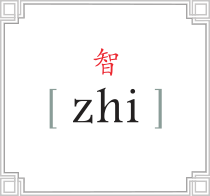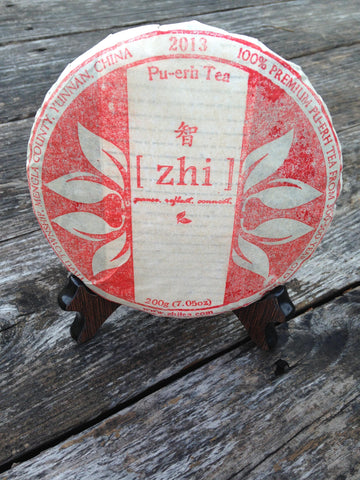Pu-erh Raw (Sheng) Limited, Numbered Zhi Private Label
Limited Edition, Total 300 pressed, numbered.
Raw 2013 Puer pressed into a 200g cake. Produced in Yiwu Township, Mengla County, Yunnan Province, China. Produced from trees between 300-500 years old. Grown in a bio-diverse forest and stewarded by the Dai people who have been managing these forests for hundreds of years.
The leaves, having endured spring and summer, bring out a rich plum flavor that evolves into sweet peach notes with the complexity that comes with aging. With each passing month, the tea gains new characteristics.
This is an *outstanding* raw puer pressed just for us. From the autumn harvest, so much mellower and milder than the spring pluckings and ready to drink. This tea was fantastic when it was picked, and now it is a world-class Puer tea that has been rated #1 Puer tea against over 5,000 Pu’er teas and over 10,000 voters back in 2014. The greenness matured into a richer amber color and flavor and the slight bitterness evolved into a sweetness like that of apricot and dried plums..
Great, deep body! Has an oolong-y mouthfeel and a long, clean finish. After three or four steeps the natural sweetness really comes through. Will evolve with time and aging is encouraged. This tea will age well. Very limited quantities. Price goes up every year about 25-30%...Great investment.
We reserve the right to limit number of units per sale of this tea.
If you haven't had a raw pu-erh that wasn't harsh and edgy, then you are in for a big surprise. This tea is like buttah! It is aging like a champ.
The health benefits of pu-erh are numerous and profound.
Call us at 512-220-3839 for rare pu-erh cakes and tuo cha. We have many in stash we are aging and selling to hardcore pu-erh fans. Some of these teas we get from Yunnan ourselves when we travel there.
AKA Pu-er, Pu-erh
Hint: Shorter steep time for more sweetness.
Gaiwan or Yi Xing Pot: (recommended)
Put about 5g or 2 tsp buds into heated vessel;
Pour 200 degree water into vessel. Brew for 20 seconds for the first brewing, 10 for second, add about five seconds for each subsequent brewing.
Western Style:
One heaping tsp per 12 oz cup, or one Tbsp per 24 oz pot
205 degree water
Steep for 2-3 minutes or to taste. Should be steeped multiple times
Discover the mysterious tea with the unique flavor and numerous health benefits.
Highly recommended to experiment with the steeping times with this lovely loose-leaf Pu-erh. A short steeping time (~2 min) reveals a lovely complexity that is often lost in longer steep times.
Traditionally Pu-erh is steeped for very short times (with larger volumes of leaves) and up to 10 steepings is common!
See what works for you...Explore the world of Pu-erh.
Pu-erh is one of the oldest types of tea in China with a history of over 1700 years, tracing back to the Eastern Han Dynasty. During its height of popularity, the tea was freely traded even used as money for the bartering of goods. Pu-erh gets its name from the city of Pu-erh in south-western China where the trade for Pu-erh was conducted. Not far from Pu-erh are the areas of Xishuangbanna and Simou, where cultivation and processing of the tea is carried out today.
Pu-erh tea is well-known for its ability to undergo a post-fermentation process designed for further aging, similar to wine. The aging process allows the tea to develop added complexity in character. With active microbes living within the tea, pu-erh evolves with each passing year. This is the most fermented tea in China. It is traditionally compressed and packed into tea cakes or bricks to age, which originated from the natural aging process that happened in the storerooms of tea drinkers and merchants, as well as on horseback caravans on the Silk Road. This method eased horseback transportation and reduced the damage to the tea.




